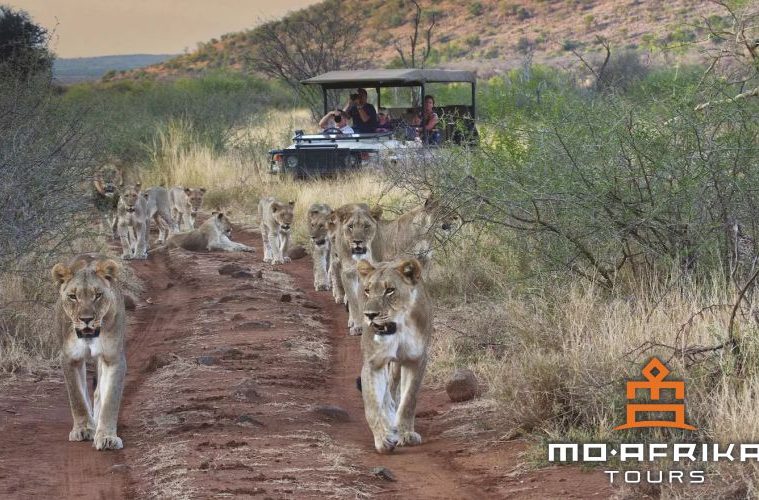The Big Five – lion, elephant, rhino, buffalo, and leopard – hold great significance for tourists embarking on African safaris. These majestic animals represent the essence of wildlife viewing, drawing visitors who seek to witness the raw beauty of Africa’s wilderness.
For Madikwe Game Reserve, nestled in a transitional zone between the bushveld and Kalahari thornveld, was not always the thriving sanctuary it is today. Re-establishing the Big Five has not only boosted its tourism appeal through Madikwe safaris, but also signalled a triumph for conservation. This success story reflects the vital role of sustainable tourism in wildlife preservation, ensuring the long-term survival of these iconic species and the ecosystems they inhabit.
Madikwe Game Reserve’s success is largely attributed to Operation Phoenix, one of the world’s largest wildlife translocation projects. Over seven years, more than 8,000 animals were relocated to Madikwe, transforming it from overgrazed farmland into a biodiversity hotspot. This monumental effort reintroduced the Big Five and many other species, making Madikwe a premier destination for safari enthusiasts while setting the foundation for conservation excellence.
One of the ways Madikwe contributes to wildlife conservation is through habitat restoration. The reintroduction of wildlife to its natural habitat after extensive farmland use allowed the ecosystem to flourish. The reserve’s careful management of the delicate balance between flora and fauna ensures that both animals and plants thrive, promoting biodiversity and a healthy ecosystem.
Another critical contribution is anti-poaching efforts. Madikwe’s focus on protecting vulnerable species, particularly rhinos, from poaching has made it a model for other reserves. Through sophisticated surveillance systems and dedicated anti-poaching units, the reserve ensures that its wildlife is safeguarded, helping species recover from the brink of extinction.
Madikwe also excels in community-driven conservation, working closely with local communities to create sustainable jobs and involve residents in conservation efforts. This model empowers communities to benefit from the reserve’s success, creating a mutual interest in preserving wildlife and the environment.
Employment opportunities in tourism and conservation reduce poverty while fostering a sense of ownership over the land and its wildlife.
Eco-tourism initiatives in Madikwe generate much-needed funds for conservation. As a malaria-free, family-friendly destination with luxury lodges, the reserve attracts high-end tourists who contribute directly to conservation through park fees and sustainable tourism activities. These funds are reinvested into protecting wildlife, maintaining habitats, and further developing the reserve’s infrastructure.
The ‘Super 7’ expansion, which includes African wild dogs and cheetahs in addition to the Big Five, has helped diversify the reserve’s appeal. The reintroduction of these endangered species adds to Madikwe’s conservation portfolio, offering tourists even more opportunities for wildlife viewing while highlighting the reserve’s commitment to saving endangered animals.
A recent and exciting development is the Heritage Park conservation corridor, a project aimed at linking Madikwe with Pilanesberg National Park. This initiative will allow for the free movement of wildlife across a larger area, enhancing genetic diversity and providing animals with access to more resources. It is a major step forward in wildlife conservation, creating a mega-conservation area that benefits both animals and eco-tourism.
Ultimately, Madikwe Game Reserve’s approach to conservation showcases the power of integrating tourism, community involvement, and environmental protection. By prioritising sustainable practices, creating employment, and protecting endangered species, Madikwe sets a precedent for other reserves in South Africa and beyond.
As visitors flock to experience the return of the Big Five, they are also contributing to a broader mission: preserving Africa’s wildlife for future generations.
ALSO SEE:
SA’s conservation organisation, Wildlife ACT awarded Best for Nature-Positive Tourism
Feature image: Supplied

